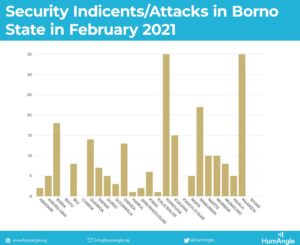Exclusive: Nigeria’s Borno State Experienced Surge In Terrorist Attacks In February
“This is an indication that the insurgents are becoming bolder at the beginning of the year,” a security source noted.

At least 224 attacks and security incidents were recorded between Feb. 1 and 28 in Borno State, the epicentre of a protracted insurgency campaign ravaging Northeast Nigeria.
HumAngle’s analysis of a Feb. 2021 report and statistical data compiled by a security agency in Borno indicated a surge in Boko Haram attacks when compared with the number of attacks (168) recorded in 2020.
“This is an indication that the insurgents are becoming bolder at the beginning of the year, which calls for more offensives into their enclaves by government forces and improved intelligence gathering and sharing on their movements,” a security source commented on the findings.
Konduga Local Government Area (LGA) in Borno central recorded 32 incidents, the same number as Nganzai Local Government Area in Northern Borno. Both localities had the highest number of attacks collated for a Local Government Area.
Other Local Government Areas with a high number of attacks were Magumeri (22), about 50km from Maiduguri, the state capital, and Bama (18), the second largest town in Borno. In March 2018, the Borno State Government had approved the return of 120,000 Internally Displaced Persons to Bama town from Maiduguri.
Other affected LGAs are Kukawa, a volatile area close to Lake Chad that recorded 15 attacks; Damboa (14) near the dreaded Alagarno forest; and Gwoza (13), a garrison town home to 60,000 people that is southeast of Maiduguri.

Some areas in Southern Borno where the terror groups have less influence, such as Bayo, Chibok, Kwaya Kusar and Shani, recorded zero attacks in February according to the security agency report.
Even though the number of attacks could be higher due to lack of access to information on hinterland communities, only a fraction of the attacks reported by the security agency were reported by local news platforms.
The Nigeria Security Tracker (NST), which catalogues violent attacks reported by the media, features 18 incidents in Borno in February — only eight per cent of what was contained in the government statistical data.
HumAngle’s analysis of a previous internal report revealed that over 3,000 major terrorist attacks and incidents occurred between Jan. 1 and Dec. 31, 2020. It was discovered that only four per cent of the attacks made it to the news and, subsequently, the NST.
Jamā’at Ahl as-Sunnah lid-Da’wah wa’l-Jihād commonly known as Boko Haram, and the Islamic State West Africa Province (ISWAP) have waged a campaign of violence that has led to over 37,000 deaths, displaced over two million, and left about 8.7 million people in need of humanitarian assistance in Northeast Nigeria and Lake Chad Basin.
Additional reporting by ‘Kunle Adebajo
Support Our Journalism
There are millions of ordinary people affected by conflict in Africa whose stories are missing in the mainstream media. HumAngle is determined to tell those challenging and under-reported stories, hoping that the people impacted by these conflicts will find the safety and security they deserve.
To ensure that we continue to provide public service coverage, we have a small favour to ask you. We want you to be part of our journalistic endeavour by contributing a token to us.
Your donation will further promote a robust, free, and independent media.
Donate HereStay Closer To The Stories That Matter




